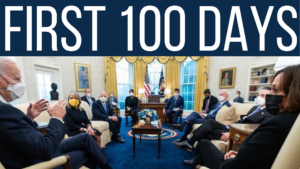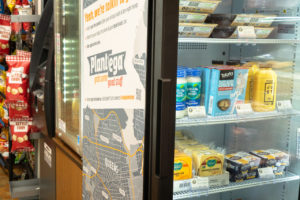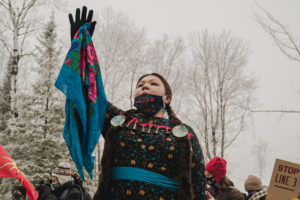As much as everything has changed, nothing has.
This mantra continues to follow me around, whispering in my ear at just the right moment and making everything seem somewhat normal again.
At the start of the year, like so many, we were feeling pretty good about the first steps into the decade. We were focused and organized with a big agenda and even bigger global stages, from the National Mall in D.C. to the Summer Games in Tokyo. We were excited to, among other things, go make a fuss.
And then everything changed.
We were hit early and hard by COVID-19, along with everyone in that bountiful family known as the music industry. Campaigns and collaborations we had incubated and curated for years evaporated before we even heard the phrase flatten the curve. The day r.Cup (the spin-off we launched to help build the reusable economy) was to be announced as one of the most innovative companies in the world by Fast Company magazine, was the same day SXSW cancelled and the live event industry fell into its long, painful hibernation.
By April, we were down to our very core.
What started then was a journey that has strengthened our enterprise and hardened our focus on what we are here to do. Through the pandemic shined our purpose.
Effect Partners is known for its history working with musicians, artists and athletes to address social and environmental challenges. And more often than not, food has been at the center of its work. A decade ago we helped catalyze reductions in toxic pesticides by sparking early stage growth in the organics movement. For years we worked with a powerhouse natural food brand, and emerging musicians, to advance local climate justice. More recently we have been entrenched in accelerating growth of the plant-based movement.
While music rocks our world, we knew by late spring that food is the medicine we need to cure the challenges we face.
The combination of existential social disruptions is a once in a generation moment to create a safer, healthier and more climate positive food system. One that both addresses our urgent hunger challenges and fortifies personal health and wellness. One that both fights for the rights of essential food workers and incentivizes innovation and market growth of lower carbon, plant-based proteins. One that accelerates both climate justice and prosperity for traditional farming based communities.
Living up to this moment is the greatest sustainability challenge modern humanity has ever faced. And as a proudly ambitious purpose-based company, with values rooted in pushing boundaries and fighting above our weight class, we were crazy enough to think we can help do something about it.
And that something is THE FOOD FIGHTERS COLLECTIVE.
The architecture of this journey was sketched in early May, during those maddening days trying to make sense of the latest CARES act rumors and PPP Max Forgiveness formulas. At its inception, the design was to:
- Recruit the best food fighters we could find by assembling a roster of food advocates we admire and respect with a wide range of perspectives and technical capabilities.
- Facilitate a virtual innovation sprint by tapping each individual’s superpowers through facilitated and structured exercises in order to find breakthrough solutions to common food security challenges.
- Test and codify our solutions by executing prototype trials and exploring learnings in order to help inspire and solidify long-term, sustained impact.
From the very first session, we knew we were onto something. Watching a handful of dynamic, passionate and engaged strangers form a language of teamwork, trust and respect so quickly brought so much light to those early Pandemia days. We hit the full circuit, from blue-sky brainstorms about the wide array of compelling food challenges to dot voting convergence on the ones we had the most passion to fight for.
And then, just weeks into our mission, George Floyd was murdered in our backyard.
Though our efforts began before we would say his name, they became more intensely focused after we put boots on the ground to amplify the calls of justice. In the days after his death, we openly discussed shutting down our early work. But we quickly realized just the opposite was needed. We doubled down on the energy of our collective and set specific objectives to advance access to healthy plant-based foods within Black and Brown communities, advocate for food justice solutions and generate resilient business opportunities for minority small business owners to help create income and wealth.
By early summer, just a few short months after our first icebreaker exercises, we secured funding for our first complete prototype trial – Plantega.
It’s clear now that this era of grand disruption is the new normal. And what’s needed more than ever is fresh ideas. These are the very roots of the Food Fighters mission – to help breakdown barriers to change with resilient, creative solutions for a more just, food secure future for all. And to achieve that mission through a dynamic, passionate and diverse cohort eager to win and inspire.
Looking back on those first few confident steps of the decade, they were taken with the deliberate intention to help accelerate climate justice. That was our original, pre-pandemia plan for the year, ambitious as it may be. And though our climb has been steep and taken us to different peaks than expected, it’s clear to us now more than ever that the fight for climate justice goes through our stomachs. Food has always been the medicine, and we can help deliver the cure.
As much as everything has changed, nothing has.
If you are hungry to help us shatter the barriers to progress and join the Food Fighters Collective, get connected and let’s conspire for good.
MEET THE FOOD FIGHTERS
Nil Zacharias is a leading expert in the growing plant-based food industry. He is an entrepreneur, consultant, author, and sought-after international speaker who has spent over a decade focused on the intersection of food, health, and sustainability. Nil currently serves as a strategic advisor to the Plant Based Foods Association, Plant Based World Conference and Expo, Infinite Foods, and other brands and organizations.
Dr. Ietef Vita – DJ Cavem is an artist, rapper, environmental and food justice activist, and the pioneer of eco-hip hop. Raised in Denver’s Five Points district, often referred to as the Harlem of the West, his interest in gardening and hip hop helped him resist the snares of gang lifestyle. Becoming vegan at age 14, he felt a calling to speak about these issues in his songs, “especially since most of the neighborhoods considered food deserts were people of color.” He’s shared the stage with Nick Jonas, Public Enemy, 2 Chains, Questlove, Wyclef Jean, among others. Offstage he’s involved with numerous organizations and projects dedicated to promoting wellness, eating healthy and environmental awareness.
Erick Castro is a former vegan restaurant owner and the creator of How To Be Vegan in the Hood, an Instagram account with over 35,000 followers that spreads the gospel of an affordable plant-based diet – especially to bodega-eating residents of New York City’s boroughs. He posts gorgeous, appetizing photos of cheap and simple meals that followers can make at home.
Joan Buyce is an award-winning food marketing and communications expert. Joan operates her own consulting business, assisting food clients with senior consulting services including brand strategy, public relations, advocacy program development and non-profit management.
Robin Ridley is a graphic designer and copywriter. She launched Parfait Studio in 2007 with a particular focus on supporting vegan brands and animal advocacy organizations.
Nicole Pacheco is a documentary film maker with an emphasis on minorities, migrant workers and disadvantaged populations.Most recently, Nicole produced “The Helper”, her first full-length feature documentary which is centered on the untold stories and aspirations of foreign domestic helpers working in Hong Kong. Nicole is currently a Masters candidate at the University of Minnesota Humphrey School of Public Affairs where she is pursuing a Public Policy degree with an emphasis on diversity, equity and immigrant rights.
Jennifer Jordon is a passionate television, event, documentary and commercial content producer with more than 15 years experience. Jordon has produced more than 200 hours of television content for a wide variety of networks, from the Food Network to the Travel Channel, from HGTV to VH1, with several series earning Emmy Award nominations and wins.



